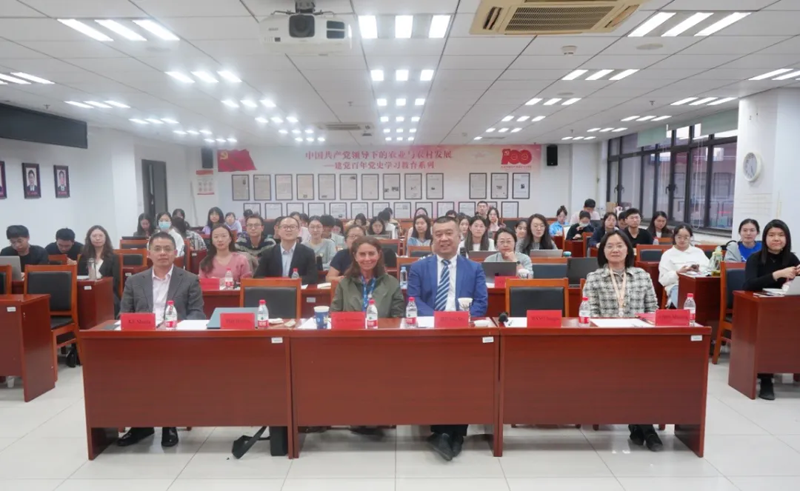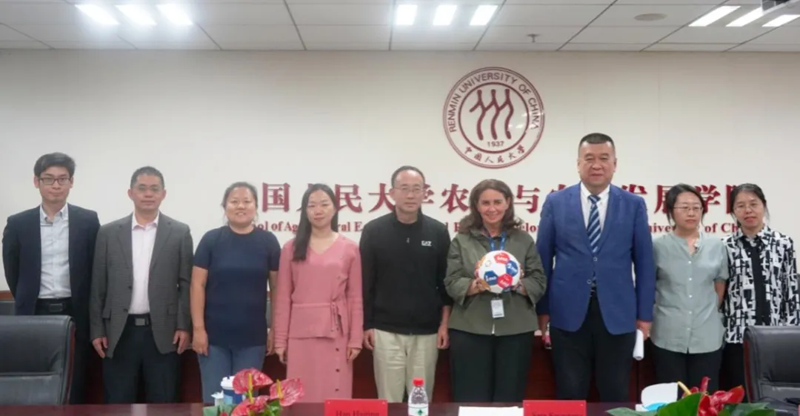
Visit by A Delegation from the International Fund for Agricultural Development (IFAD) to Our School
On the afternoon of October 25, 2023, Dr. Sara Savastano, Director of the Research and Impact Assessment Division of the International Fund for Agricultural Development (IFAD), and IFAD economist Dr. Han Haiting visited our school for an exchange. The delegation was received by Professor Qiu Huanguang, Dean of the School of Agricultural Economics and Rural Development, and Professor Zheng Shi, Vice Dean. The meeting was also attended by Professor Wang Sangui, Director of the China Poverty Alleviation Research Institute; Professor You Jing, Director of the Rural Development Department; Professor Ke Shuifa, Director of the Department of Forestry and Resource Economics; Professor Chen Minpeng, Director of the Agricultural Resource Environment and Management Teaching and Research Office (under preparation); Associate Professor Yu Jialing, Deputy Director of the Department of Agricultural Economics; Associate Professor Li Jiajie, Director of the Department of Food Economics; Associate Professor Wang Xiangrui; Assistant Professor Ye Ziwei, and over 50 student representatives.
Zheng Shi welcomed the delegation and briefly introduced the School of Agricultural Economics and Rural Development. Savastano expressed gratitude for the warm reception. During the lecture session, Professor Wang Sangui delivered a presentation titled "Chinese Experience in Poverty Alleviation," introducing the visiting guests to China's anti-poverty journey and experiences, summarizing the Chinese theoretical framework of poverty alleviation developed through practice, and highlighting the "Renmin University School" of anti-poverty research.

Following this, Savastano provided an overview of IFAD and delivered an academic report titled "IFAD Impact Assessment: Measuring Impact of Transformational Food Systems." She introduced the cutting-edge methods used by IFAD to evaluate the effectiveness of its initiatives aimed at improving the economic income, production efficiency, climate resilience, and food nutrition and safety of impoverished populations worldwide. She also outlined the future focus areas of IFAD.
In the interactive Q&A session, faculty and students engaged in in-depth discussions with Savastano on topics such as the application of big data technology in evaluating the effectiveness of poverty alleviation projects, the development of international organizations in China, and future career prospects. Savastano encouraged more Chinese students to participate in international agricultural governance.
After the lecture, both sides continued to discuss future cooperation. Qiu Huanguang emphasized the strong research advantages of the School of Agricultural Economics and Rural Development at Renmin University of China, noting the broad prospects for cooperation with IFAD. He expressed hope that both parties could leverage their respective strengths to enhance the level of exchange and cooperation. The department heads each introduced their departments, and Yu Jialing presented on "Sustainable Approach to Food Security: Practice in China," discussing the school's current research progress in addressing climate change, developing conservation agriculture, and ensuring food security through sustainable production methods.
Savastano highly praised the school's research capabilities, especially the comprehensive training provided to students in fieldwork and research skills. She expressed a desire to strengthen communication and cooperation between IFAD and the school and invited faculty and students to visit IFAD. Both parties also explored academic cooperation in depth, looking forward to high-quality collaboration in more fields and at more levels in the future.


